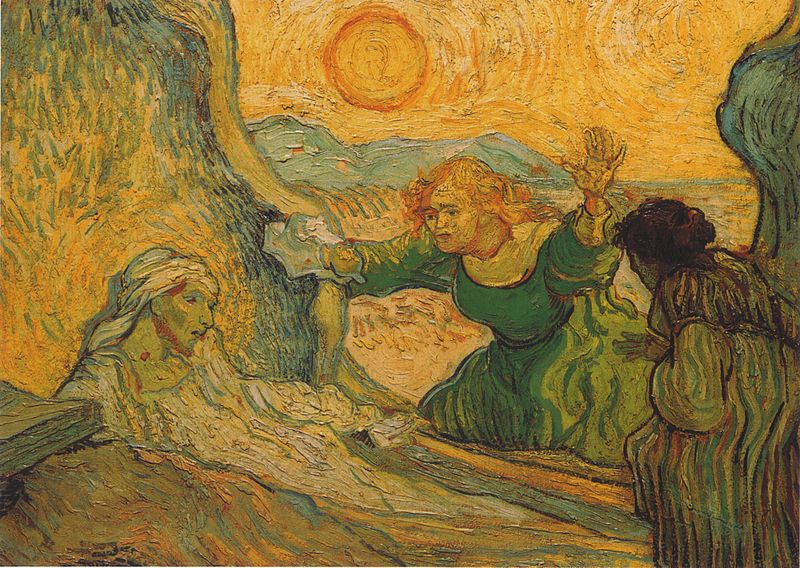5TH SUNDAY OF LENT
To listen, please click:
http://cradio.org.au/index.php/shows-and-audio/fifth-sunday-of-lent/

To listen, please click:
http://cradio.org.au/index.php/shows-and-audio/fifth-sunday-of-lent/

The gospel of John is divided into two books namely the Book of Signs (Chapters 1-12) and the Book of Glory (Chapters 13-22). The Book of Signs contain the seven miracles of Jesus namely the wine of Cana, the healing of the royal official, the curing of the invalid, multiplication of loaves, the walking on the lake, curing the blind and the raising of Lazarus. The miracles are called signs because they point to the divinity of Jesus. The story of the raising of Lazarus for the fifth Sunday of Lent is the greatest of the seven signs because it prefigures the Resurrection of Jesus.
Bethany, two miles from Jerusalem, was the hometown of Martha, Mary and Lazarus who were siblings. It must be a favorite retreat place for Jesus whenever he travelled to Jerusalem from Galilee where he enjoyed the hospitality of the two sisters and the company of Lazarus whom Jesus loved very dearly.
When Lazarus fell ill, Martha and Mary sent a word to Jesus but the Jesus answered that the illness would not end in death. Instead he stayed where he was for two more days before they went back to Judaea. By the time they arrived, Lazarus was already four days in the tomb. Jesus knew that Lazarus was dying but why did he not go right away and heal him? Because Jesus was in charge and he controlled the situation. Sometimes when we pray, we feel the urgency for God to respond right away and we forget that God is in charge, not us. If Jesus went right away, he could have healed Lazarus which would be just an ordinary miracle or sign. But because he was in charge, Jesus now could perform the greater miracle: raising a dead man to life!
When Martha heard that Jesus was coming, she went out to meet him while Mary remained in the house: the typical attitudes of Martha as active and Mary as contemplative (Lk. 10:38-42). Now comes the beautiful dialogue between Jesus and Martha. As most of us who are in the same situation, Martha reproached Jesus: “Lord if you had been here, my brother would not have died.” (this will be repeated by Mary when she met Jesus). But Jesus assured her “Your brother will rise again”. Martha misinterpreted Jesus when she thought of the resurrection of the dead at the end of time since general resurrection was a common belief during that time. At this point, Jesus made the most profound proclamation “I am the resurrection and the life…! When asked whether she believed this, Martha said “Yes. Lord!” Then she added the profession of the three Christological affirmations: “I believe that you are the Messiah, the Son of God, the one coming to the world.” When Jesus saw Mary weeping together with the Jews, he was deeply troubled. Then Jesus asked where they laid Lazarus and they said “Sir, come and see.” But why would Jesus asked? Because he needed the cooperation of the community in performing this greatest sign. Then Jesus wept (which is one of the two rare instances of weeping, the first was when he saw Jerusalem at a distance). Jesus, needed again the help of the community, said “Take away the stone.” Here Martha showed her fear by referring to the foul odor of Lazarus being dead for four days. After the stone was rolled, Jesus prayed to the Father and cried out “Lazarus, come out” which was the dramatization of Jn. 5:28 (“the hour is coming and is now here when the dead will hear the voice of the Son of God and those who will hear will live”). Our resurrection already starts here and now, when we follow the voice of Jesus to come out of the caves of our selfishness and sinfulness. When Jesus said “untie him and let him go” it was the turn of the community to unbind Lazarus and welcomed him as a new creation. Eternal life starts here and now when our families, friends and community are able to unbind us of the many un-freedom of prejudices, biases and false judgments.
The paradox of this story is that when Jesus gave life back to Lazarus, it led him to his own death. As disciples of Jesus are we ready to do the same?
No comments:
Post a Comment